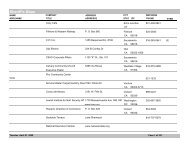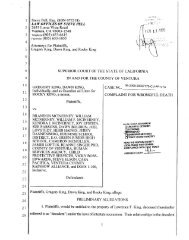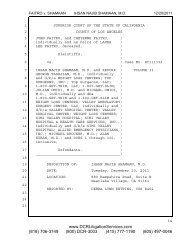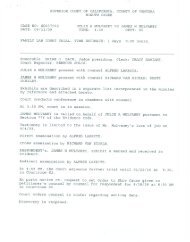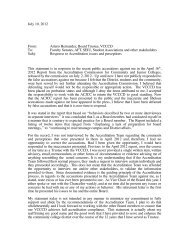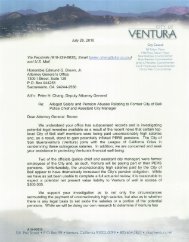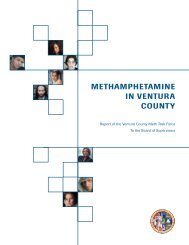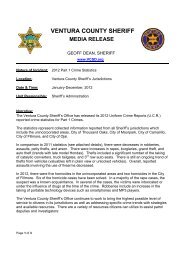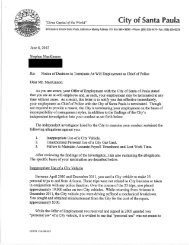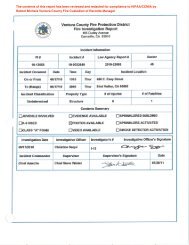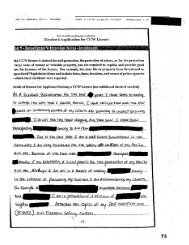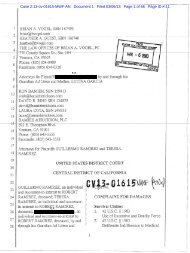Metrolink peer review report - Ventura County Star
Metrolink peer review report - Ventura County Star
Metrolink peer review report - Ventura County Star
Create successful ePaper yourself
Turn your PDF publications into a flip-book with our unique Google optimized e-Paper software.
METROLINK COMMUTER RAIL SAFETY PEER REVIEW PANEL<br />
Final Report – January 5, 2009<br />
Issue Papers<br />
• SOP #15 – Engineering – Operating & Flagging Rules give SCRRA’s Rules and Training coordinator the<br />
responsibility “to ensure that employees act in accordance with the General Code of Operating Rules (GCOR)<br />
for Maintenance of Way (MOW).” It is the contractor’s responsibility to test its own employees, <strong>review</strong> the<br />
data and trends, and take action to correct any deficiencies either through retraining, reassignment or<br />
removal; SCRRA should simply oversee the process to make sure it is being carried out effectively.<br />
Incident Response: When there was a single contractor for Operations and Maintenance, the contractor was<br />
responsible for responding to incidents such as vehicle failures in service, accidents and emergencies. Today, the<br />
responsibilities for responding to incidents, providing incident command, and directing service restoration after<br />
an incident belong to no one officially. As a matter of habit, the contractors’ Trainmasters (some of whom<br />
worked for the single-contractor operating <strong>Metrolink</strong> service at its inception) usually fill these roles; however, the<br />
transportation contract does not compel them to do so. Furthermore, the contractors’ staff may not be large<br />
enough to ensure a reasonably quick response to any incident. SCRRA should <strong>review</strong> these issues, clearly assign<br />
the responsibilities for incident response and make sure that there are adequate resources to fulfill the<br />
responsibilities. Contractual changes may be needed and/or changes in SCRRA staffing.<br />
Vehicle Troubleshooting: The train and engine crews are relatively unskilled in troubleshooting vehicle faults.<br />
Minor equipment problems can develop into unnecessary service interruptions while maintenance employees are<br />
dispatched to correct on-line failures. The mechanical contractor’s personnel could be effective in training the<br />
train and engine crews, but, because the contractor for transportation is not the same as the contractor for vehicle<br />
maintenance, this type of interdisciplinary support is uncommon. <strong>Metrolink</strong> service could be improved if the<br />
train and engine crews were more familiar with basic troubleshooting procedures. SCRRA may consider a<br />
mechanism for this type of inter-functional cooperation, perhaps through a well-defined QMP position.<br />
Resource Allocation<br />
The Panel noted that SCRRA recently addressed a key operational need by creating the position of Assistant<br />
Executive Officer, Operating Services. This senior manager should be responsible for allocating resources within<br />
Operations while the CEO, or his designee, should focus on allocating resources among non-operating positions<br />
and between operating and non-operating positions. It appears, however, that while the Assistant Executive<br />
Officer, Operating Services, has assumed broad responsibility for overseeing the day-to-day operation, the process<br />
of balancing the operating resources to reflect operational and safety priorities can be improved.<br />
The Panel observed that there is a need to have the organizational flexibility to reallocate SCRRA staffing<br />
resources to address safety critical positions. For example, the Operating Department could reduce the Field<br />
Service Representatives’ positions and add Trainmasters. SCRRA could merge the responsibilities of both<br />
classifications under the contractor. As part of this <strong>review</strong>, SCRRA should determine the responsibility for<br />
management of Field Operations and Incident Response. This responsibility is currently shared with the<br />
Transportation contractor, yet this responsibility is not part of the Transportation contractor’s contractual scope<br />
of work.<br />
In addition, SCRRA should consider the annual budget process as an opportunity to reallocate staff among<br />
functions on an ongoing basis. The budget process should not be limited to asking for more resources to address<br />
specific new needs. It should be a routine opportunity to reallocate resources to meet the Agency’s top objectives.<br />
As part of the Organizational Analysis, SCRRA should perform an internal staffing <strong>review</strong> to determine if the<br />
staffing levels and skills are sufficient to manage as an operating commuter railroad.<br />
29



